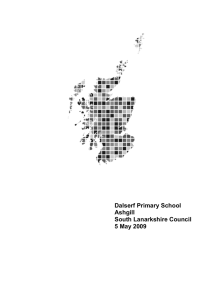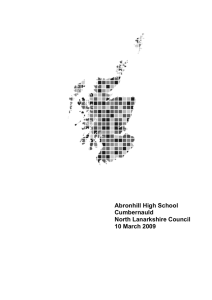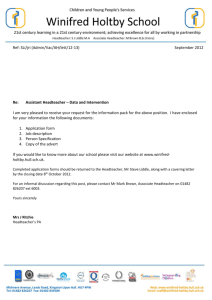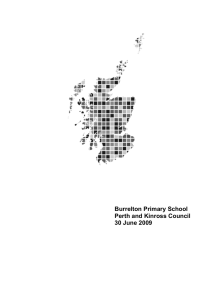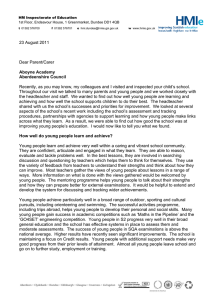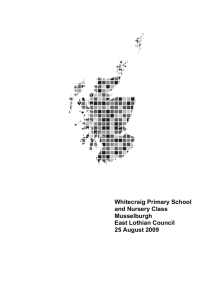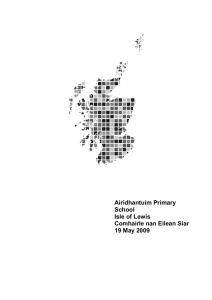Dalreoch Primary School West Dunbartonshire Council
advertisement
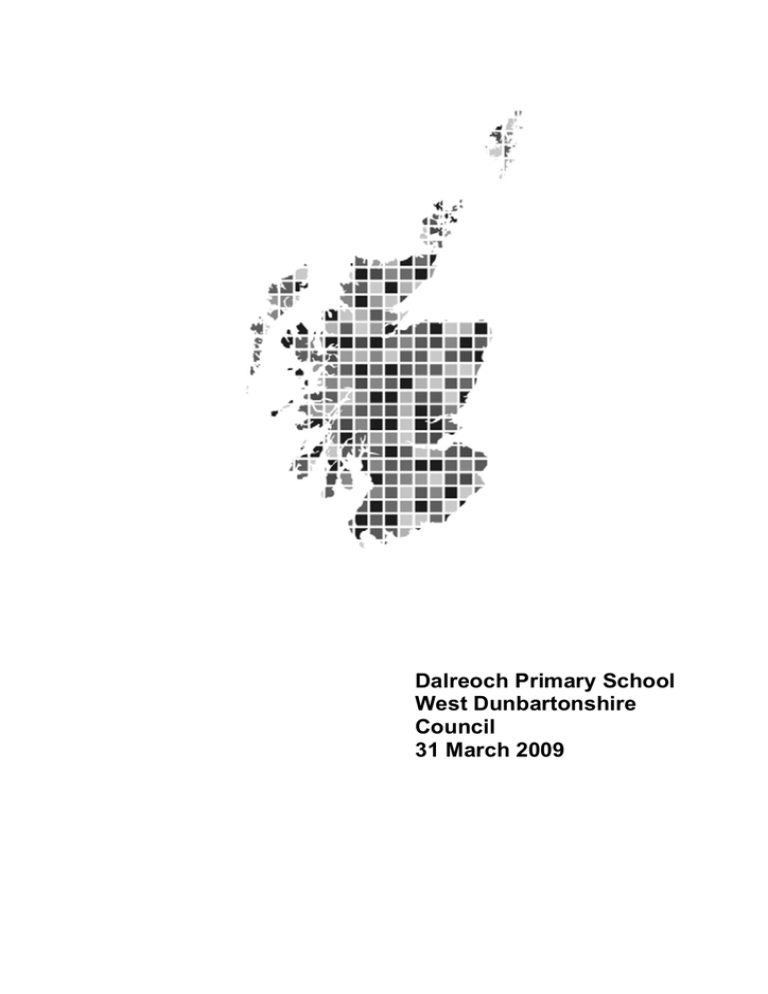
Dalreoch Primary School West Dunbartonshire Council 31 March 2009 We published a report on Dalreoch Primary School in May 2007. That report set out key strengths of the school and main points for action. We carried out a follow-through inspection in March 2008 and published a report in May 2008. This is the report of the second follow through inspection carried out in January 2009. It tells you about improvements since the original inspection in the quality of education which the school provides. It also comments on how the school is getting on with the main points for action. First we focus on changes in the core work of the school. We explain how the school has got better at helping children to learn and benefit from being at the school. Next we look at the key processes which enable this to happen, including the involvement of parents1. Our report also describes developments in the ‘ethos’ of the school, by which we mean how well children are cared for and how much is expected of them in all aspects of school life. Finally we comment on improvements in leadership to help the school achieve its aims. A copy of this report has been placed on the HMIE website www.hmie.gov.uk. Where applicable, you will also find descriptions of good practice in the school and analyses of questionnaire returns. 1 Throughout this report, the term ‘parents’ should be taken to include foster carers, residential care staff and carers who are relatives or friends. Contents 1. The school 2. Particular strengths of the school 3. How well do children learn and achieve? 4. How well do staff work with others to support children’s learning? 5. Are staff and children actively involved in improving their school community? 6. Does the school have high expectations of all children? 7. Does the school have a clear sense of direction? 8. What happens next? 1. The school Dalreoch Primary School serves the Dalreoch area of Dumbarton. The school roll has declined slightly since the original inspection. Staff have reorganised the use of accommodation to improve children’s learning experiences. Education Services appointed an acting headteacher in August 2007. She was appointed permanently to the post in August 2008. 1 2. Particular strengths of the school • Children’s responsible attitudes towards one another and their learning. • Improvements in children’s learning and attainment. • The commitment of staff to continuous improvement. • The leadership of the headteacher. 3. How well do children learn and achieve? Children’s attainment has improved notably. Teachers have improved the quality of reading and writing lessons. Children are achieving well in these areas and they now have a better idea of what they need to do to improve. Staff have used children’s ideas to introduce more practical activities to mathematics lessons. The headteacher is helping staff to implement Curriculum for Excellence. Staff have begun to link children’s learning across curriculum areas to increase children’s enjoyment and improve their understanding of key topics. At all stages teachers set challenging cooperative tasks which give children a sense of achievement. Teachers help children to understand the purpose of the lesson. They review learning at the end of the lesson and involve children in assessing one another’s work. At P1 and P2, children learn very well through lively play activities. Teachers now give children tasks and activities which are at the right level of difficulty. They use assessment effectively to provide appropriate challenge to meet the learning needs of all children. 2 4. How well do staff work with others to support children’s learning? Teamwork among staff is now very effective. Staff work well together to identify children who need support with their learning. The visiting learning support teacher gives class teachers useful advice and practical help to meet the learning needs of all children. The depute headteacher has played a strong role in setting up a new system to identify children’s learning needs quickly and help to meet these needs well. As part of this system, learning assistants work well alongside teachers to support children. The school is effectively encouraging parents to be involved in their children’s learning. Parents are actively involved in a range of activities in the school including educational visits, special events and clubs. 5. Are staff and children actively involved in improving their school community? Staff morale is significantly improved. All staff are fully involved in the school’s improvement plans. The headteacher has been particularly successful in taking account of everyone’s views on what the school’s aims and values should be. Staff are also working well with children and their parents to improve the school. Children have responsibility for many aspects of school life including running a playtime club and managing their new base. The eco committee have designed an outdoor classroom for the school. Children can explain how working together and talking to teachers about their learning has made them more responsible for their own learning and achievement. The school has further strengthened its good reputation in its local community. 6. Does the school have high expectations of all children? There have been significant improvements in the climate for learning and relationships within the school. More purposeful learning is taking place in classrooms. Staff now have high expectations of what 3 children can do. Children are attaining better and achieving more success. They have positive attitudes towards their own achievement and are ambitious and confident. Parents are pleased with the school’s emphasis on high standards in all that their children do at school. 7. Does the school have a clear sense of direction? There have been significant improvements to the leadership of the school. The headteacher has given a high priority to improving learning and achievement. She has been particularly successful in involving everyone in continuing to improve the school. The depute headteacher is working effectively with the headteacher. Staff are working well together to improve children’s learning. The headteacher meets regularly with class teachers to discuss each child’s progress. She also gives them appropriate advice and guidance. As a result of better school self-evaluation, children’s learning and achievement is improving. The education authority has provided very strong support and the school now performs well. The headteacher and staff know how to continue to improve the school. 8. What happens next? There is clear evidence of significant improvement since the May 2007 inspection report. The school now performs well overall. With the clear commitment of the headteacher and staff to securing further improvement, the school is very well placed to continue to improve. Standards in meeting children’s learning needs and self-evaluation are now at a satisfactory level or better. HM Inspectors will make no further visits in connection with the May 2007 inspection report. HM Inspector: Jacqueline Sinclair 31 March 2009 4 To find out more about inspections or get an electronic copy of this report go to www.hmie.gov.uk. Please contact the Business Management and Communications Team (BMCT) if you wish to enquire about our arrangements for translated or other appropriate versions. If you wish to comment about any of our inspections, contact us at HMIEenquiries@hmie.gsi.gov.uk or alternatively you should write in the first instance to BMCT, HM Inspectorate of Education, Denholm House, Almondvale Business Park, Almondvale Way, Livingston EH54 6GA. Our complaints procedure is available from our website www.hmie.gov.uk or alternatively you can write to our Complaints Manager, at the address above or by telephoning 01506 600259. If you are not satisfied with the action we have taken at the end of our complaints procedure, you can raise your complaint with the Scottish Public Services Ombudsman (SPSO). The SPSO is fully independent and has powers to investigate complaints about Government departments and agencies. You should write to the SPSO, Freepost EH641, Edinburgh EH3 0BR. You can also telephone 0800 377 7330, fax 0800 377 7331 or e-mail: ask@spso.org.uk. More information about the Ombudsman’s office can be obtained from the website at www.spso.org.uk. Crown Copyright 2009 HM Inspectorate of Education


